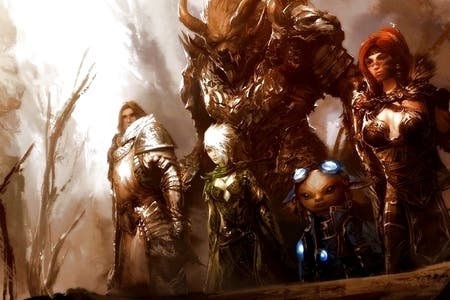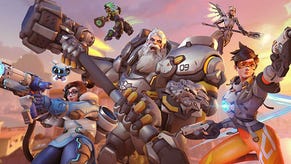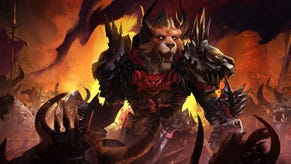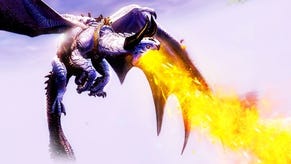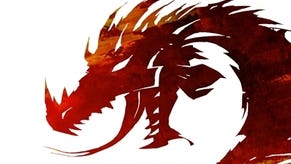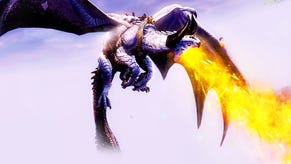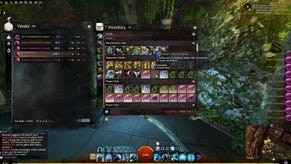Guild Wars 2 review
A new era.
Funny thing about expectations: they can blind you both ways. After claims that Guild Wars 2 would shake up the stagnant genre of massively multiplayer online games, many were surprised, and a little disappointed, to find that it looked and played just like an MMO. But deflated expectations can be just as deceptive as the hype that led to them.
It's true that you can hardly call Guild Wars 2 an iconoclast. From its high-fantasy head to its role-playing toes, it's an unashamed genre piece, an MMO through and through, a giant engine designed to grind out experience points and loot beneath the tattoo of a hundred thousand hotkeys. But don't let its familiarity blind you to the fact that this engine has been re-engineered from first principles, and purrs sweeter than any has before.
In fact, Guild Wars 2 is by far the most important - and plain enjoyable - massively multiplayer game since 2004's World of Warcraft. At long last, it's the changing of the guard.
To understand what ArenaNet has achieved and how, it's more helpful to look at the details than the big picture. Let's start with one apparently small change to the MMO rulebook.
In most of these games, it's traditional that once you attack an enemy in the open world, it's tagged as "yours". Its experience points and loot belong to you alone, as does any quest progression associated with killing it. If you're playing in a party, these things are rationed between you. If you help to kill a monster that's already been tagged, you get nothing. Things are done this way because someone once decided that it was fair.
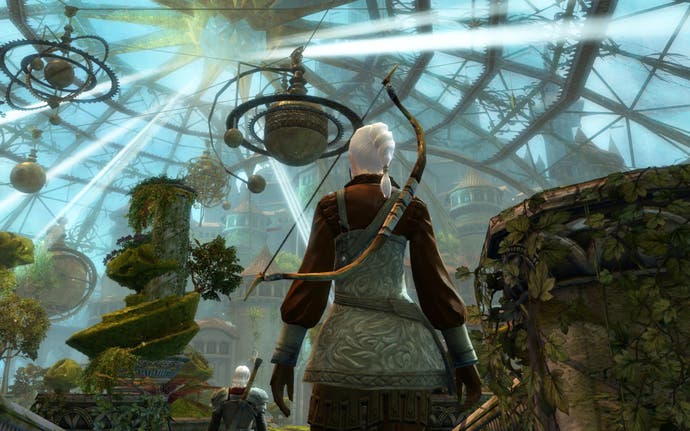
The end result of this policy is that adventurers meeting each other by chance on the monster-infested fields of some hostile landscape regard each other with suspicion and frustration. They're encouraged either to keep their distance or indulge in quick-draw contests to "steal kills" as they queue for spawns.
Here's how Guild Wars 2 handles tagging: you so much as land a single blow on a monster, you get full credit for killing it. Experience, loot, quest progression, the works. It doesn't make any difference if you're in a group or not. It doesn't matter if the monster was killed by two players or 20. It doesn't matter if you just hit auto-attack and took a sip of tea while someone you've never met did all the hard work. Everyone wins.
Is that fair? Did you earn it? Who cares? It's more fun - and just as importantly, it's more social. You're rewarded for helping others, because many hands make light work. And the result is that in Guild Wars 2's world of Tyria, those wary queues of self-interested souls don't exist. In their place are happy, noisy scrums of players, digital flash mobs coalescing and dispersing around dynamic events: an army of adventurers fighting together for the common good. Isn't this what massively multiplayer gaming is supposed to be like?
One small change; one giant, wonderful result. Next to the libertarian work ethic espoused by most of these games, Guild Wars 2 is practically a socialist utopia. The needs of the one and the many are aligned, and the awful tension between solo and group play that plagues most MMOs disappears in a puff of goodwill.
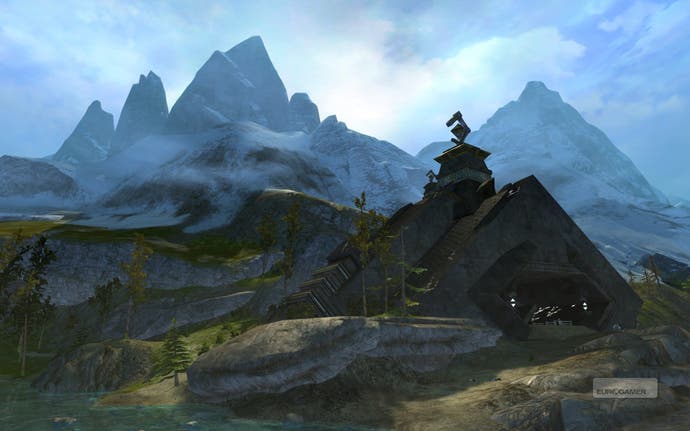
Perhaps it's because the first Guild Wars, with its private play-fields, was only a quasi-MMO that ArenaNet has now embraced open-world multiplayer gaming with an enthusiasm and commitment which none of its competitors can match. Everything flows from its determination to lift the barriers that prevent people playing together (although, in fact, there's not that much in the game that you can't achieve solo if you want or have to).
There's the way quests are organised, triggering and completing automatically depending on where you are, rather than who you happen to have spoken to. It keeps you out in the world, exploring and following the action, rather than jogging back and forth on a personal treadmill. When you fire up Guild Wars 2, it's your map you open first, not your quest log - and nothing better encapsulates how this game makes you feel more like an adventurer than an errand boy. (Besides, there is no quest log.)
There are the dynamic multiplayer events that take place according to see-sawing schedules as threats on the map regroup and are repelled. You'll have taken part in dozens of these before you realise that there's not much compelling you to do so (they don't count towards the tasty rewards you get for 100% completion of a zone). It's just fun, and feels natural, to join in.
Then there are the character classes. ArenaNet felt that the need to compose groups of players according to the "holy trinity" of tanking, healing and damage-dealing roles was too great an obstacle to playing together, so it removed it entirely. Whether you're a spell-casting Mesmer or tough, armoured Guardian, you can heal yourself and others and stand toe-to-toe with any enemy in the game. This is perhaps Guild Wars 2's bravest move, and it's what enables the free-flowing ease with which the game's community can co-operate (including taking the pain and wait times out of forming a group for one of the game's five-player dungeons).
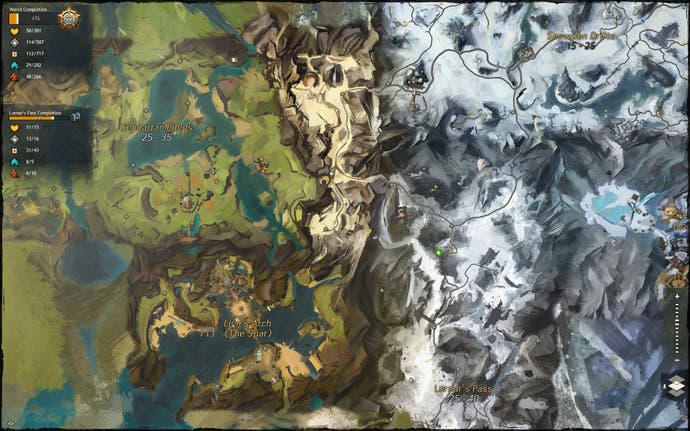
Inevitably, there is a price to pay for all this harmony and ease, and it's a certain shallowness. The jack-of-all-trades classes all have great personality and are fun to play, but without that "holy trinity" there's little room for the deliciously interlocking designs and deep team dynamics of the traditional MMO, so brilliantly expressed by Blizzard in WOW. When tackling one of the dungeons you do still need to work as a team and concentrate, and the freedom (necessity, in fact) of movement in the more immediate combat is welcome compensation. But it's hard to imagine high-end dungeon-running in Guild Wars 2 achieving the same diamond-hard pressure.
This shallowness has a social dimension, too. It's so easy to play with others that you rarely need to communicate much to do it, and the chances of a friendship or a good laugh springing out of a random encounter are tiny. The generally mature and collaborative atmosphere makes up for this though, and the lack of snark in the chat channels is remarkable - it seems that ArenaNet's generous mood is catching.
It's when Guild Wars 2 attempts to go against its democratic principles that it really grates. The inclusion of a personalised "story" quest chain not unlike Star Wars: The Old Republic's (though more limited in scope and, thank God, less encumbered with exposition) does help you make sense of the game's fiction - but jars with its gameplay. The instanced solo missions are poorly balanced, take you out of the world, and introduce such foreign notions as checkpoints with a total lack of logic or grace. The quality of the writing and voice-acting varies a lot between the five races, too (as Quintin discovered).
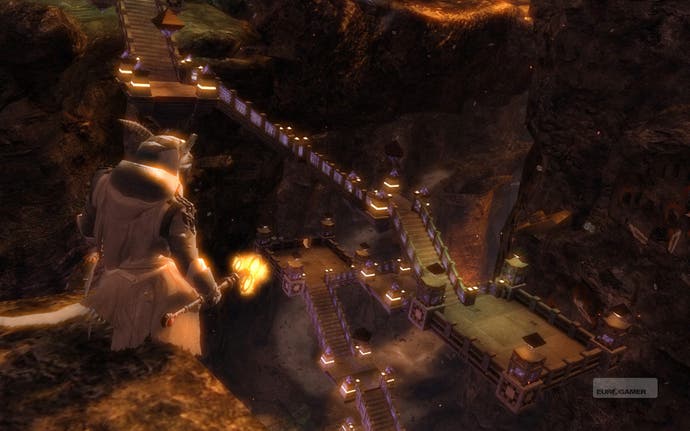
No such worries about the quality of the artwork. ArenaNet has chiselled out a consistently gorgeous and naturalistic setting on an epic scale, finding elegant twists on high-fantasy motifs, from the jagged steampunk war engines of the Charr cat-people to the wild, phosphorescent gardens that grow around the plantlike Sylvari. The capital cities, in particular, are a sight to behold. You're encouraged to explore and admire every inch of this staggering canvas by a breadcrumb trail of map discovery which even includes some light platforming challenges (incidentally, this must be the first MMO with jumping that doesn't suck).
It's a beautiful place, overflowing with hand-crafted detail, that will soak up dozens of hours of dreamy virtual sight-seeing with ease - it's hardly the generic, factory-made fantasy of, say, Rift or Kingdoms of Amalur. But for me, there's still something missing in Tyria. It's a little anodyne. It lacks the personality or ambiance, the wit or the grit that might make it feel less like a chocolate-box paradise and more like a home.
What a place to take a holiday, though. And you can treat it as just that, because ArenaNet isn't charging a subscription fee for Guild Wars 2 - so it feels more like a vacation than a vocation. You're free to dip in and out and out at your own pace, to wallow or splash. This impacts the game design as well as your bank balance, since Guild Wars 2 doesn't have to waste your time with makework or offer a vanishing-point approach to character advancement to justify its monthly stipend.
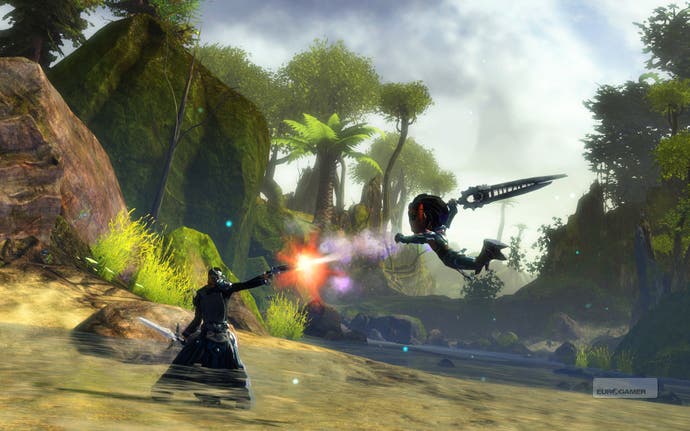
It's just less of a grind. Despite the level cap of 80, the character classes give up their goods fairly early on through the rapid and streamlined acquisition of new skills; the emphasis, instead, is on flexible customisation of a deck of just 10 skills to suit your mood or the situation. Bountiful loot and a refined item game take up the slack. Levelling is a steady saunter rather than an uphill slog, virtually every activity rewards you with experience, and your level adjusts downward to the zone you're in to ensure the content always poses an appropriate challenge (with equipment boosts persisting so you still get a chance to feel like the badass who's been around the block).
Player-versus-player is even more surprisingly grind-free. PVP in most MMOs is now structurally indistinguishable from Call of Duty - all team deathmatch and rank rewards. But in Guild Wars 2 you can choose between the utterly level playing field of the "structured" conquest game, with its pre-set loadouts of skills and equipment, or the ridiculously entertaining macro warfare of World vs. World. Both automatically raise your character's stats to maximum level.
World vs. World, which pits three servers against each other for control of a giant map, is a daring attempt to make a competitive mode that's genuinely about group effort rather than individual skill, and it offers tempting rewards not just to the solo player, but to the organised guild and the entire community. Not coincidentally, it's the most successful, enjoyable and popular large-scale PVP mode in an MMO for a very long time. (You can read more about it in Quintin's report.)
It's not the levelling, it's the taking part that counts. That's what makes Guild Wars 2 great. Almost every aspect of its design serves the individual player and whole community equally, and there's a breezy willingness to put the content ahead of the grind throughout. It's a little lightweight, perhaps; its fantasy world is more picturesque than truly enveloping, and its social and gameplay hooks offer instant gratification over ties that bind. But it's still the most coherent, seamless, social and fun MMO in a long time - and the only one that can call itself truly modern.
